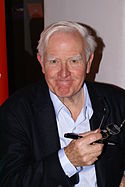John le Carre Quote
They were ashamed of having pencils and paper. But it’s no good just throwing them away, is it? That’s what I learnt in the end. That’s why I left the Party, I suppose. Smiley wanted to ask him how Fennan himself had felt, but Fennan was talking again. He had shared nothing with them, he had come to realize that. They were not men, but children, who dreamed of freedom-fires, gipsy music, and one world tomorrow, who rode on white horses across the Bay of Biscay or with a child’s pleasure bought beer for starving elves from Wales; children who had no power to resist the Eastern sun, and obediently turned their tousled heads towards it. They loved each other and believed they loved mankind, they fought each other and believed they fought the world.
They were ashamed of having pencils and paper. But it’s no good just throwing them away, is it? That’s what I learnt in the end. That’s why I left the Party, I suppose. Smiley wanted to ask him how Fennan himself had felt, but Fennan was talking again. He had shared nothing with them, he had come to realize that. They were not men, but children, who dreamed of freedom-fires, gipsy music, and one world tomorrow, who rode on white horses across the Bay of Biscay or with a child’s pleasure bought beer for starving elves from Wales; children who had no power to resist the Eastern sun, and obediently turned their tousled heads towards it. They loved each other and believed they loved mankind, they fought each other and believed they fought the world.
Related Quotes
She was a gypsy, as soon as you unravelled the many layers to her wild spirit she was on her next quest to discover her magic. She was relentless like that, the woman didn't need no body but an open r...
About John le Carre
Le Carré's third novel, The Spy Who Came in from the Cold (1963), became an international best-seller, was adapted as an award-winning film, and remains one of his best-known works. This success allowed him to leave MI6 to become a full-time author. His other novels that have been adapted for film or television include The Looking Glass War (1965), Tinker Tailor Soldier Spy (1974), Smiley's People (1979), The Little Drummer Girl (1983), The Russia House (1989), The Night Manager (1993), The Tailor of Panama (1996), The Constant Gardener (2001), A Most Wanted Man (2008) and Our Kind of Traitor (2010). Philip Roth said that A Perfect Spy (1986) was "the best English novel since the war".
